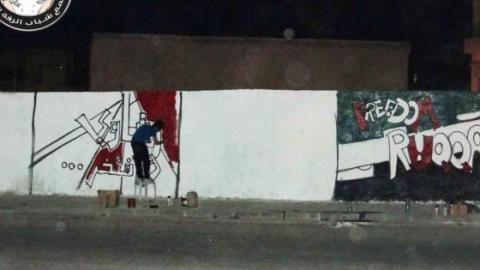For Syrians, demanding freedom has extended from struggling against dictatorship - facing murder, jail, detention and destruction of infrastructure - to trying to establish a new foundation for the country that they long dreamed of. Is it really possible to build from within all this destruction?
If anyone can achieve the impossible, it is Syrians. They have turned the French students uprising´s slogans - "Be realistic, demand the impossible" - into "Be realistic and make the impossible."
After the withdrawal of the Syrian army from Raqqa in March 2013, the city suffered a tremendous power vacuum, especially in public services. The streets were filled with garbage and remnants of the regime barricades.
A discussion was started by a group of 35 activists who had remained in the city, which led to the creation of a rally under the name “The Youth of Raqqa”. One of these activists, surgeon Ayman al-Khalaf, has explained to Syria Untold:
"A week after liberation we started discussing how to solve services problems resulting from the withdrawal of the regime and disabling its institutions. We decided to establish the rally as a civil institution without subordination to any political, religious or military affiliation."
The rally adopted the role of the municipality, cleaning the streets, taking the garbage away from the city center, and removing the regime barricades. In the words of Ayman:
“We have dreamt of living without this regime for so long. Now the dream has come true, so we have to be responsible and turn the city to a real icon of freedom"
Activists also started the "Clean the National Hospital" campaign, which lasted until the city´s main hospital was cleaned from the remnants of bombing and destruction; and the "I Will Not Leave my School" campaign, aiming to rehabilitate schools so that children could continue their studies as soon as possible.

Activists did not forget Syrian refugees arriving from all over the country. A relief kitchen was set to provide about 500 meals a day to refugees, despite the lack of bread caused by the shortages. This led to the “Our Bread Campaign”, in which pieces of bread were distributed in small bags with a sign reading “my loaf is your loaf” and the saying of the Prophet Mohammad "None of you will have faith unless you wish for others what you wishes for yourselves."
The youth rally also focused on Syria's children, which are suffering a dramatic situation since the beginning of the struggle. Campaigns such as “Children´s Right to Live” aim to defend their rights and help them by engaging them in theatre workshops and other activities focusing on solidarity, cooperation and teamwork spirit, educating children on true values that promote a new sense belonging to the country.
Other campaigns have focused on Syrian prisoners of conscience, such as the April 7 "Free Behind Bars" sit-ins.

Solidarity with other Syrian towns has also emerged in Raqqa, through campaigns such as the “Euphrates Candles of Freedom."
Through their work, the Raqqa youth are doing what the state institutions should be doing. In the words of the young activist and doctor:
“We will stay strong, because Raqqa is the capital of liberation and we will continue to work to keep the city live up to its name regardless of the process of militarization.”
Thanks to Global Voices Online with their help translating this piece.




